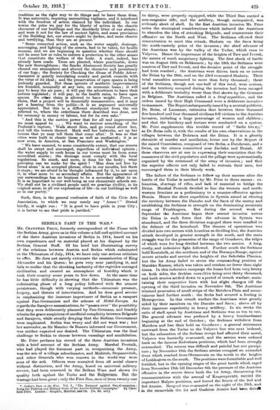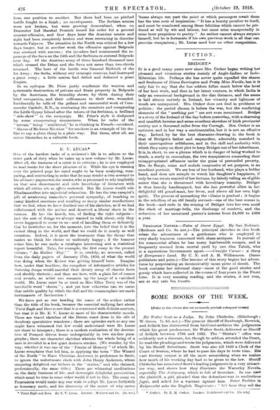SERBIA'S PART IN THE WAR.*
MR. CRAWFIIRD PRICE, formerly correspondent of the Tinges with the Serbian Army, gives us in this volume a full and spirited account of the three Austrian invasions of Serbia in 1914, based on his own experiences and on material placed at his disposal by the Sorbian General Staff. Of his brief but illuminating survey of the relations between Austria and Serbia which culminated in the Ultimatum of July, 1914, we have only one serious criticism to offer. He does not merely extenuate the assassination of King Alexander and his Queen: he goes very near justifying it, and fails to realize that the shocking barbarity of the regicides outraged civilization and created an atmosphere of hostility which it took their country some years to live down. At the same time he has little difficulty in showing that the Ultimatum was the culminating phase of a long policy followed with the utmost persistence, though with varying methods—economic pressure, forgery, and threats of intervention. And he does good service in emphasizing the immense importance of Serbia as a rampart against Pan-Germanism and the scheme of Mittel-Europa. As regards the Sarajevo assassinations, he "passes over" the possibility that they were deliberately planned by Pan-Germans, and frankly admits the grave suspicions of unofficial complicity between Belgrade and. Sarajevo, while stoutly denying that the Serbian Government were implicated. Serbia was weary and did not want war ; but her surrender, as Sir Maurice de Bunsen informed our Government, was neither expected nor desired. The Ultimatum was the final challenge to Serbia to choose between vassalage and annihilation.
Mr. Price prefaces his record of the three Austrian invasions with a brief account of the Serbian Army. Marshal Poutnik, who had played the foremost part in reorganizing the Army, was the son of a village schoolmaster, and Mishitch, Stepanovitch, and other Generals who won renown in the world-war were sons of the soil. Officers were recruited from all social classes without distinction, and the Army, based on universal military service, had been seasoned in the Balkan Wars and shown its quality both against the Turks and the Bulgarian& But the wastage had been great ; only the First Ban, men of from twenty-one 1 • _Serbia's Part in the War. Vol. L, "The Rampart against esneeennanku: : being the Political and Military Story of the Anstro-Serbian Campaigns." By Que- lled Price. London : Simpkin, Marshall, and Co. 17e. el. note to thirty, were properly equipped, while the Third Ban carried a non-magazine rifle, and the artillery, though unimpaired, was seriously short of shell. In- the first Austrian invasion Mr. Price notes the strategical considerations which induced the Austrians to abandon the idea of attacking Belgrade, and concentrate their offensive on the North and West. The Serbians effected their concentration to meet this attack, Shabatz on the Sava being the north.easterly point of the invasion ; the chief advance of the Austrians was by the valley of the Yadar, which runs to Valyevo. Hence the importance of the heights of Tser and Iverak, the scenes of much sanguinary fighting. The first shook of battle was on August 16th on Belikamen ; by the 19th the Serbians were masters of Tser and Iverak, and the decisive point of the struggle had been reached ; the Austrians were driven back on or across the Drina by the 20th, and on the 23rd evacuated Shabatz. Their total casualties amounted to more than forty thousand ; those of the Serbians, though not one-half of this total, were serious, and the territory occupied during the invasion had been ravaged with a deliberate brutality worse than that shown by the Germans in Belgium. The Austrians called it a Strapexpedition, and the orders issued by their High Command were a deliberate incentive to massacre. The Report subsequently issued by a neutral publicist,
Dr. Reiss, of Lausanne, estimates that between three thousand • five hundred and four thousand civilians fell victims to the Austrian invasion, including a large percentage of women and children ; and that the butchery and torture were conducted on a system. Mr. Price supplements this terrible record of " Sadie frer zy," as Dr. Reiss calls it, with the results of his own observations in the villages between the Dobrava and the Drina. It is a ghastly chronicle of murder and mutilation, borne out by the Report of the mixed Commission, composed of two Serbs, a Dutchman, and a Swiss, on the crimes committed near Zavlaka and Brziak. All these observers are at one in expressing their conviction that the massacres of the civil population and the pillage were systematically organized by the command of the army of invasion ; and that the superior officers not only failed to restrain their men, but encouraged them in their bloody work.
The failure of the Serbians to follow up their success after the battle of the Yadar is ascribed by Mr. Price to three causes : ex- haustion, shortage of rifles, and lack of material to bridge the Drina. Marshal Poutnik decided to line the western and north- western frontiers as a preliminary to a ommter-offensive against Bosnia. Hence the short expedition in Syrmia aimed at clearing the territory between the Danube and the Sava of the enemy and establishing the Serbians in strength on the dominating mountain range of Frushkagora. But during the second week of September tke Austrians began their second invasion across the Drina in such force that the advance in Syrmia was abandoned, and the three divisions engaged there were recalled to the defence of the homeland. The theatre of operations was divided into two sectors with Loznitza as dividing line, the Austrian attack developed in greater strength in the south, and the main struggle was for the possession of the range of Gouchevo, the ridges of which were for long divided between the two armies. A long, costly, and indecisive fight followed. Further south the Serbians held Kostalnik, at the northern end of the Boranya Range, against severe attacks and carried the heights of the Sekolska Planina, but the 1st Army failed to storm the commanding position of Matohko Kamen, which was taken and retaken no fewer than eight times. In this indecisive campaign the losses had been very heavy on both sides, the Serbian casualties being over thirty thousand; and both armies settled down to &period of trench warfare, main- taining their respective lines with but slight changes till the opening of the third invasion on November 6th. The Austrians retained possession of small strips of tho Matchva Plain and moun- tainous land further south : the Serbs had secured a footing in Herzegovina. In this trench warfare the Austrians were greatly aided by their monitors on the Danube and Sava ; above all by their immense superiority in heavy artillery. In six weeks the ratio of shell spent by Austrians and Serbians was as ten to ono. The general advance was prefaced by a heavy bombardment beginning at the end of October ; the Serbians withdrew from Matchva and lost their hold on Goachevo ; a general retirement eastward from the Yadar to the Valyevo line was next ordered, but the exhaustion of the Serbian troops had affected their moral, Valyevo was hurriedly evacuated, and the armies were ordered back on the famous Koloubara positions, which had been strongly entrenched. The retreat was difficult and painful but not precipi- tate ; by November 16th the Serbian armies occupied an extended front which reached from Obrenovatz on the north to the heights of Leshkagera on the south. The positions were formidable and well fortified, but in the opening stages of the great battle which raged from November 19th till December 6th the pressure of the Austrian offensive in the centre drove back the 1st Army, threatening the communications with the arsenal of Kragouyevatz, earned the important Malyen positions, and forced the fronts of the 2nd and 3rd Armies. Beograd was evacuated on the night of the 29th, and in the meanwhile the 1st and Ouslitse Armies had been drmill
from one •position to another. But there had been no pitched beetle fought to a finish ; no envelopment. The Serbian armies were not broken, but were growing demoralized, when on December 2nd Marshal Poutnik issued his order for a general counter-offensive, and four days later the Austrian eentre and right had been completely broken and were -retreating in disorder towards Valyevo. The situation in the North was critical for a few days longer, but in another week the offensive against Belgrade was crowned with suosess ; the invaders had commenced the re- passage of the Sava on the 14th and the Serbians re-entered Belgrade next day. Of the Austrian army of three hundred thousand men which crossed the Drina and the Sava not more than two-thirds returned. The hero of the battle was General Mishitch of the 1st Army : the Serbs, without any strategic reserves, had destroyed a great army ; a little 'nation had defied and defeated a great Empire.
In an epilogue Mr. Price justly condemns the wanton and systematic ,destruction of private and State property in Belgrade by the Austrians, the brutality shown by them during their brief occupation, and their callousness to their own wounded. Incidentally he tells of the gallant and resourceful work of Com- mander Cardale, R.N., in combating the monitors and recapturing the Little Gypsy Island after the return of the Serbians, a brilliant " side-show " in the oampaign. Mr. Price's style is disfigured by some exasperating mannerisms. When he talks of the " terrain " being " accidental," he is thinking in Frenoh—czecidenti. " Slaves of Madame Nicotine " for smokers is an example of his dis- like to say a plain thing in a plain way. But these, after all, are minor blemishes in a valuable book.



































 Previous page
Previous page